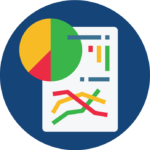For a Part C system, the fiscal data profile depicts demographic, service delivery, infrastructure, and administrative data in a variety of ways to make the fiscal data more comprehensible to users.
Fiscal Data Trend Profile Template (2023)


For a Part C system, the fiscal data profile depicts demographic, service delivery, infrastructure, and administrative data in a variety of ways to make the fiscal data more comprehensible to users.

When presented effectively, data are engaging, comprehensible, relevant, and

November – December 2022. Are you looking for better ways to share your publicly-reported data with stakeholders? Do you wish you had access to an easy-to-use tool to help you create engaging data displays?

Data visualization continues to be a hot topic in all sectors, including education, health care, government, and business. It is essential in helping to interpret data and to communicate information. When we can easily turn data into useful information, it becomes actionable. We hope you use this toolkit to advance this goal in your own work.

Conference: OSEP Leadership Conference Date: July 2022 Presenter: Haidee Bernstein, Nicholas Ortiz, Tony Ruggiero In this virtual poster presentation from the 2022 OSEP Leadership Conference, DaSy and ECTA staff addressed […]

This DaSy toolkit provides guidance for effectively creating and presenting data visuals.

This 2015 document was developed to help technical assistance (TA) providers and state staff define and limit the scope of data analysis for program improvement efforts, including the State Systemic […]

The DaSy toolkit is a resource containing information, guidance, and templates to help Part C and Part B 619 program staff build effective data teams and support conditions for a culture of data use at the state and local levels. The toolkit is organized around key steps to building a culture of data use in your state or local team.

A series of webinars organized by DaSy on collecting, analyzing, and using data through virtual engagement.

This DaSy toolkit provides an orientation to IDEA data and other data-related topics to help stakeholders meaningfully participate in conversations about programmatic issues and decisions.